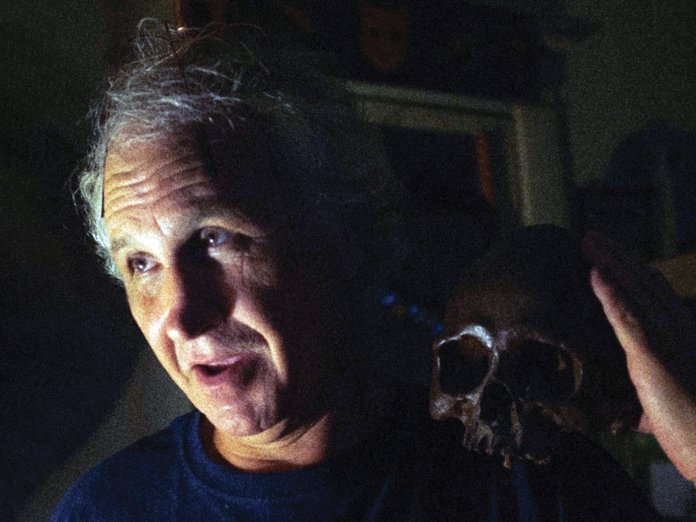You probably haven’t heard of the schizoid zither. Or the buzzstick. Or the boing box. These are all names that semi-reclusive musician David Michael Moore has given to his homemade instrument, a wooden box with strings and keys that he describes as “a simple hybrid stringed instrument that combines experimental percussion and melody on the same soundboard. It can be plucked like a harp, played with sticks like a santur, set up to bend strings like a koto, or played with a slide and finger picks. It is basically an ornamental soundboard that one can set up and play in different ways.”
Moore is an American original, a carpenter and artist who lives in a rundown house in rural Mississippi with his dog Bobo, lots of books, a 200-year-old human skull, homemade furniture and, of course, his musical instruments. As well as the schizoid zither, he plays drums, piano, keyboards, accordion plus chainsaw, dog bones and witches’ pot. Moore has been making music since the 1970s, and since the mid-’90s began issuing CDs under the monikers Dayday Moemoe, David Michael Moore and David Moore. The best of these recordings have now been collected by Indiana-based record label Ulyssa on Flatboat River Witch 1994–2015, which is available to purchase digitally or on cassette. The label has plans to follow up with re-releases of some of these original albums.
Moore might be unusual but he’s an excellent musician, and the songs on Flatboat River Witch are well recorded and beautifully played, essentially semi-improvised folk-jazz that combines the extraordinary sound of the boing box – a sort of all-in-one guitar, drum and keyboard that sounds simultaneously wooden and metallic – with more conventional instruments. He borrows rhythms and textures from folk and world music, peppers these with found sounds and occasionally sings, a little hoarse but warm and melodic enough. He calls his music “traditional but perverted”, but the rippling percussion of “Jungle Pie” or piano-led meditations like “Orion’s In The Bucket” and “Cottonwood Night Coming Down” are moving and accessible pieces of music. Many feel semi-improvised, like the 11-minute “Johnny Quixote”, but the funny ode to the posterior, “Butt Deluxe”, shows he can keep things short and sweet when he needs to.
His songs often speak of local people and places he has known – “No names have been changed to protect anyone. They could care less anyway,” he says in the sleevenotes to one CD – but are equally inspired by the landscape and cadence of the mighty river that flows nearby. This is music infused with mystery, humour and humanity. There’s something of Tom Waits or Dan Reeder about all this, and traces of the Southern Gothic of Jim White and Johnny Dowd, but it seems daft to look for comparisons with an artist so unforced, naturalistic and unique. Delve in: the weirdness is waiting.


